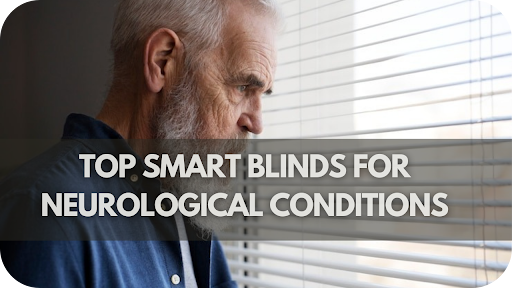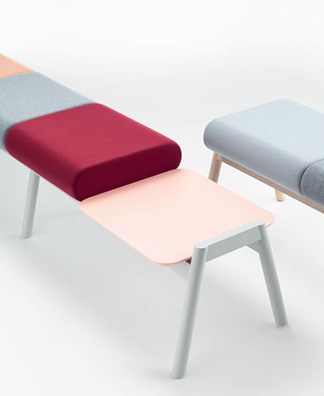As someone who’s seen how small tasks can become monumental challenges for loved ones with neurological conditions, I know firsthand the power of accessible solutions. Smart blinds are a transformative tool that enables independence in ways we often overlook.
Imagine effortlessly adjusting the light, ensuring privacy without struggling with cords or reaching awkwardly. For those with Parkinson’s or ALS, this can mean not just convenience but a boost in confidence and comfort at home. Here’s a look at the best options tailored for accessibility and ease.
Key Features of Smart Blinds for People with Neurological Disorders
Smart blinds for individuals with neurological disorders, such as Parkinson’s and ALS, come with essential features designed to enhance accessibility, comfort, and independence. Here’s a more detailed numbered breakdown of the critical features of intelligent blinds for individuals with neurological disorders:
- Voice Control Compatibility: Voice control can significantly reduce physical strain for people with Parkinson’s, ALS, or similar conditions, making everyday adjustments seamless and enhancing their autonomy.
- Remote and App-Based Controls: For those with limited mobility, controlling blinds without physical access is invaluable. An app-based interface on a smartphone or tablet enables adjustments to be made while sitting, lying down, or even when away from home, offering flexibility and convenience.
- Automated Scheduling: Automated scheduling lets users pre-set specific opening and closing times for their blinds, eliminating the need for manual daily adjustments. It supports a structured environment and can be programmed to suit individual preferences, such as dimming the room at night or letting in morning light.
- Cordless Design: Smart blinds’ cordless design minimises clutter and removes the risk of entangled cords, providing a safer environment. This feature is particularly beneficial for individuals with limited dexterity, reducing obstacles and making accessing other room parts easier
- Quiet Motors: Smart blinds are often equipped with quiet motors, ensuring minimal noise during operation. This quiet functionality is especially beneficial for maintaining a peaceful atmosphere in rest-oriented spaces like bedrooms or living rooms. The quiet operation prevents disturbances for individuals needing to adjust their blinds frequently or during rest, promoting a more restful environment supporting well-being.
- Long-lasting battery Life or Plug-In Power Options: Many smart blinds offer long-lasting, rechargeable batteries or plug-in power options, reducing the need for frequent battery replacements. Rechargeable battery-powered blinds eliminate the hassle of regular replacements, while hard-wired options provide a permanent, low-maintenance solution for users who may find battery changes challenging.
- Energy Efficiency: By reducing heat loss in winter and blocking excess heat in summer, these blinds contribute to a more comfortable home environment and can lead to lower energy bills. A consistently comfortable environment for individuals with neurological conditions enhances day-to-day comfort and supports overall well-being.
Best Smart Blinds Suitable for Neurological Conditions
Finding the best smart blinds for neurological conditions like Parkinson’s and ALS means prioritising accessibility and ease. Here’s a look at top options designed to enhance independence and comfort at home.
1. Motorised Roller Blinds
Motorised roller blinds are a sleek, practical choice. They provide easy control through a remote, smartphone app, or voice assistants like Alexa and Google Home. Options in light-filtering and blackout fabrics allow users to adjust light and privacy effortlessly.
Roller blinds are particularly beneficial for individuals with limited mobility or neurological conditions, as they eliminate the need for manual adjustment. Their simple operation and compatibility with smart home systems offer a streamlined experience that supports independence and convenience.
2. Motorised Roman Blinds
Motorised Roman blinds blend modern functionality with classic design, offering a stylish look alongside automated control. Operated through remote, app, or voice commands, they provide a soft, layered appearance that adds warmth to any room.
For users with neurological conditions, Roman blinds offer accessible operation without physical effort, helping to maintain privacy and comfort. The ability to schedule opening and closing times further reduces daily strain, making them a practical, attractive option for those needing extra support in daily tasks.
3. Motorised Venetian Blinds
Motorised Venetian blinds are ideal for flexible light control, with adjustable slats that tilt for precision. Available in materials like wood, aluminium, and PVC, these blinds add sophistication and are controlled through remote or app integration.
They offer voice-command compatibility, enabling hands-free adjustments that benefit individuals with neurological disorders. Venetian blinds can set routines or control light intensity without manual handling, making them a valuable choice for those seeking control and convenience in managing natural light.
4. Motorised Vertical Blinds
Motorised vertical blinds are perfect for large windows or sliding doors. They have vertical slats that can tilt or slide open for optimal light and privacy control. These blinds operate through remote, app, or voice control, making them accessible for individuals with limited dexterity.
Vertical blinds’ design minimises dust accumulation and allows easy adjustments without physical strain. Available in blackout and light-filtering materials, they provide flexibility and ease of use, making them a highly suitable option for users with neurological conditions who require minimal handling.
5. Motorised Honeycomb (Cellular) Blinds
Motorised honeycomb blinds, known for their unique cellular design, offer energy efficiency and a quiet, smooth operation. The honeycomb structure traps air, adding insulation and helping to regulate room temperature.
Controlled by remote, app, or voice assistants, honeycomb blinds minimise the need for physical handling and support users with neurological conditions. They’re available in light-filtering and blackout styles, providing privacy and light control options.
Their insulating properties and convenient, hands-free operation make them a smart choice for maintaining comfort and energy efficiency.
6. Motorised Curtains and Drapes
Motorised curtains and drapes offer a luxurious and practical window treatment, combining ease of use with elegance. Operated via remote, app, or voice control, they’re suitable for individuals who may find manual curtain operation challenging.
With various fabric options and smart home compatibility, motorised curtains allow users to effortlessly control light and privacy. Scheduling functions can automate curtain opening and closing, making them ideal for bedrooms or living rooms where comfort, accessibility, and aesthetic appeal are paramount.
Benefits of Smart Blinds for Individuals with Parkinson’s and ALS
Smart blinds significantly benefit individuals with Parkinson’s and ALS, enhancing independence, safety, and comfort. Find out how these innovative features can simplify daily life and support greater ease at home.
- Enhanced Independence: Smart blinds enable users to control light and privacy independently, using simple commands or a remote app. This independence empowers individuals needing help with basic tasks like adjusting blinds.
- Ease of Operation: With options for voice activation, smartphone control, and remote access, smart blinds eliminate the need for manual adjustments. This feature simplifies daily routines for those with Parkinson’s or ALS who may struggle with hand coordination or physical strength, allowing control from anywhere in the home.
- Increased Safety: Cordless designs reduce risks of tangling and accidental entrapment, which can be particularly valuable for individuals with limited mobility. By removing the need to manipulate blinds physically, smart blinds also reduce the risk of falls or injury associated with reaching and bending.
- Energy Efficiency: Smart blinds can be programmed to open and close based on sunlight patterns, helping regulate room temperatures without manual intervention. This automation supports energy savings and maintains comfort levels, lowering heating and cooling costs.
- Improved Comfort and Privacy: Smart blinds offer customisation options such as light-filtering, blackout, or variable slat control, giving users greater comfort and privacy with ease. This flexibility allows individuals with neurological conditions to create a comfortable environment suited to their unique needs, enhancing their overall quality of life.
- Reduced Need for Physical Assistance: By integrating with voice assistants and apps, smart blinds lessen the need for caregivers to assist with light and privacy adjustments, freeing up time and energy for caregivers and users.
Choosing the Right Smart Blinds
Selecting the right smart blinds for individuals with Parkinson’s or ALS involves choosing features prioritising ease, safety, and comfort. From voice control to cordless designs, here’s what to consider for optimal accessibility.
- Prioritise Ease of Use: Select blinds with straightforward operation methods such as voice commands or smartphone controls. For individuals with Parkinson’s or ALS, hands-free options like Alexa, Google Assistant, or Siri integration allow for simple adjustments without physical effort, providing both independence and convenience.
- Look for Cordless Designs: Cordless smart blinds are safer and easier to manage, eliminating the need for manual cord handling. This design benefits individuals with limited hand control, reducing entanglement risks and enabling smoother operation.
- Consider Automated Scheduling Features: Blinds with automation settings can be pre-scheduled to open and close at certain times, helping users maintain privacy, regulate light, and save energy without daily adjustments. This feature mainly benefits individuals with limited mobility, offering hands-off functionality throughout the day.
- Evaluate Motor Noise Levels: Quiet motorised blinds are a good choice, especially for bedrooms or living rooms. Excessive noise can be disruptive, so choose blinds with quiet motors to ensure peaceful operation, enhancing comfort and suitability for various home parts.
- Select Customisable Light and Privacy Control Options: Light control options, such as blackout, light-filtering, or adjustable slats, allow users to create the ideal environment for comfort and privacy. For example, blackout blinds are perfect for bedrooms, while light-filtering options work well in living spaces where softer light is preferred.
- Consider Power Source and Battery Life: Look for blinds with long-lasting battery life or plug-in options to reduce maintenance needs. Rechargeable or hard-wired options are convenient choices that offer reliable performance for individuals who may struggle with battery replacement.
- Choose Durable and Low-Maintenance Materials: Blinds made from easy-to-clean, durable materials reduce maintenance hassle. This feature is precious for users with limited strength or mobility, ensuring blinds remain in good condition with minimal upkeep.
Conclusion
Find out how smart blinds can transform daily life, enhancing independence and comfort for those with neurological conditions.
Ready to make a difference at home? Explore Into Blinds, Australia’s most trusted blinds and curtains supplier, and find smart blinds tailored to your needs. Embrace ease, safety, and style—why wait? Visit Into Blinds today!


